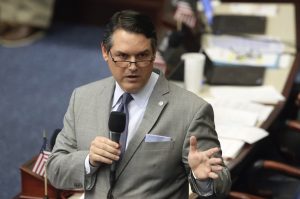News
How the far right tore apart one of the best tools to fight voter fraud
By: Miles Parks | NPR
Posted on:
WASHINGTON, D.C. (NPR) — On a night in January 2022, Louisiana Secretary of State Kyle Ardoin stepped on stage in a former airbase in Houma, La.
With American flags draped from the stage, the topic of the night was democracy.
The state’s chief voting official joked that he was competing with a former LSU Tiger great playing in the NFL playoffs the same night.
“I want to thank you all for coming out, competing with Joe Burrow is pretty tough!” Ardoin laughed.
But these were election die-hards.
The group hosting the event — We The People, Bayou Chapter — is one of hundreds of so-called election integrity groups that have popped up across the country since 2020, motivated by former President Donald Trump’s lies about voting.
During the Q&A portion of the event, people asked about how to stop dead people from voting “to support the Democrats” and voiced a number of other popular election conspiracy theories.
“I think one of the reasons we had so much distrust from this past election was because all of a sudden either over the course of the night, or in the wee hours of the morning, votes were discovered,” said one man, repeating a common false claim about how votes were tallied in 2020.
But Ardoin wasn’t just dropping by to talk about electronic voting machines or mail ballot fraud.
He was making an announcement: Louisiana would become the first state ever to pull out of an obscure bipartisan voting partnership known as the Electronic Registration Information Center, or ERIC.
ERIC is currently the only system that can catch if someone votes in more than one state, which is illegal. And election officials widely agree it helps to identify dead people on voting lists.
But Louisiana was done with it.
“This week I sent a letter to [ERIC], suspending Louisiana’s participation in that program,” Ardoin said.
At the time, in early 2022, most Americans had never heard of ERIC.
But in Houma, it seems in large part due to a far-right misinformation machine, Ardoin’s announcement garnered 15 seconds of applause.
It was the first of many times to come in which Republican officials would turn their back on this tool they once praised, in an effort to score political points with their base.
This NPR investigation, which found video of the Houma event posted to Facebook, is the first to report that Ardoin announced his ERIC decision to conservative activists.
And a deeper look at the red-state exodus that followed — eight states and counting have now pulled out of ERIC — shows a policy blueprint for an election denial movement, spearheaded by a key Trump ally, eager to change virtually every aspect of how Americans vote.
Even if it means making voter fraud easier to get away with.
“It’s this crazy zeal to get out of ERIC,” said J. Christian Adams, a conservative elections attorney, “that is going to cause voter fraud to flourish.”
The far right finds a new target
The first crack in ERIC surfaced at the time in a press release.
On Jan. 27, 2022 — a day after the We The People event in Houma was publicized locally — Ardoin released a statement saying he was putting the state’s ERIC membership on pause, citing “concerns raised by citizens, government watchdog organizations and media reports.”

“Everybody looked at this and said, ‘This is insane, what are you talking about?’ ” said one state election official who has worked for Republican secretaries of state but did not have permission to speak publicly. “As soon as [Ardoin] did that — that created this pressure on the other Republican states that wasn’t there before.”
ERIC has been around since 2013, but up until early last year, it operated under the radar. It was mentioned at election conferences and almost nowhere else.
“Honestly, nobody knew what ERIC was,” said Kathy Boockvar, who oversaw voting in Pennsylvania from 2019 to 2021 as secretary of the commonwealth.
The organization is a nonprofit voting partnership — completely voluntary — that allows member states an efficient way to share data to keep their voter rolls more up-to-date. It lets local election officials know when their voters move, die or illegally vote in more than one state in the same election.
“The little secret is that maybe more than 10 years ago, if somebody voted in Ohio, in Florida, in Arizona and Texas, you would have never known,” said Ohio Secretary of State Frank LaRose, a Republican, in an interview with NPR earlier this year. “With ERIC, we can compare our voter rolls to those states.”
But in January 2022, the tool drew the ire of one of the most prolific misinformation peddlers on the internet: a website called the Gateway Pundit.
The right-wing website is known for pushing conspiracy theories, including the so-called birther theory about former President Barack Obama, and that survivors of the Parkland shooting in Florida were crisis actors. More recently, it published an article implying COVID vaccines were 98 times worse for people than the virus itself.
About a week before Louisiana’s Ardoin made his reference to “media reports,” the Gateway Pundit began targeting ERIC. The website published a series of articles that falsely said the bipartisan partnership was a “left wing voter registration drive,” bankrolled by billionaire George Soros, aimed at helping Democrats win elections.
It’s become clear the site ignited the election denial movement’s fixation on ERIC.
NPR analyzed hundreds of thousands of posts on five alternative social media sites frequented by the far right — Gettr, Gab, Parler, Telegram and Trump’s Truth Social — over the past two years, and found that conversation about ERIC really only began after the first Gateway Pundit article published.
The Gateway Pundit’s initial article drew extensively on the writing and interviews of Adams, the conservative voting attorney.
In late 2021, Adams appeared on a conservative radio program and called ERIC “diabolical.”
His voting advocacy law firm has sued a number of states for records related to ERIC. And he even wrote what’s believed to be the first article ever alleging a connection between Soros and ERIC, back in 2016. (The Soros-funded Open Society Foundations has given money previously to The Pew Charitable Trusts, which helped start ERIC, but Soros has never had any involvement in the organization.)
In an interview with NPR this year, Adams said he never intended his criticisms to lead to states actually leaving the organization.
“My view is that it’s better to be in ERIC than not in ERIC,” Adams said, because without it, “it’s absolutely impossible to do cross-state checking to see who’s voting twice in federal elections.”
Adams took credit for being the first to criticize ERIC, citing concerns about transparency, but when asked how the debate turned from organizational tweaks into states leaving, he said people with more extreme views cherry-picked what they wanted to see in his work.
The far right served his critiques to a wider audience of people, primed since 2020 to believe there is a broad national effort to steal elections. ERIC’s novel and complicated structure — a national organization that no regular person had heard of — fit perfectly into that false narrative.
“The citizens on the right have, after 2020, gotten highly engaged in election administration. They’re not going away,” Adams said. “They’re not always doing harm either. It wasn’t long ago that everybody on each side of the political spectrum was a fan of transparency, a fan of citizens being allowed to know what their government was doing. And that’s what these individuals view themselves as doing: trying to get to the bottom of what ERIC is up to.”

Since 2020, Secretary Ardoin has found himself on a tightrope familiar to many Republican election officials.
He’s an experienced voting administrator, having worked in the secretary of state’s office for roughly a decade. But the majority of GOP voters still don’t believe Joe Biden won the 2020 election legitimately, and they have little confidence in election officials, especially those in states that aren’t their own.
Last year, Ardoin was gearing up to run for reelection himself, and facing numerous challenges from his right in a state Trump won by almost 20 percentage points. He was soon engaging with people who deny the 2020 election results in a way he had largely avoided previously.
He set aside speaking limit rules at a public meeting last year, for instance, so MyPillow founder and election denial influencer Mike Lindell could talk at length to a commission assigned with picking Louisiana’s next voting system.
“[Ardoin] acknowledged to me that it had become very politically unpopular and that there had been a lot of heat politically about [ERIC],” said Ohio’s LaRose, who said he spoke with Ardoin last year around the time he pulled his state out of the partnership.
LaRose ran for reelection last year in Ohio, and he said he noticed the issue bubbling up on the campaign trail too.
“You can see where somebody who’s out there trying to prove their conservative bona fides in a primary, which is what you do, would read this [Gateway Pundit] article and say, ‘OK, that thing is bad, let’s get our state out of it,’ ” LaRose said. “But hopefully over time, the noise about this starts to die down and other states look to get back into it.”
LaRose spoke with NPR on Feb. 17.
Exactly a month later, he announced Ohio was leaving ERIC as well.
How — and why — ERIC came to be
Fifteen years ago, David Becker got a bunch of election officials together in a room and asked them what he could do to help make voting better.
Becker is a former Justice Department voting rights attorney who was working at The Pew Charitable Trusts at the time.
“Every single election official we asked back in 2008 said voter registration,” Becker said.
After the chaotic 2000 presidential election, Congress mandated that states start keeping computerized statewide voter registration lists. But keeping those lists up-to-date felt virtually impossible for government offices with limited resources, says Becker, who now runs a nonprofit that helps local elections officials.

That makes life tough for local voting officials, who are trying to plan precincts and communicate with voters, based on addresses that often turn out to be wrong. For voters, that can mean longer lines and mail ballots getting sent to the wrong places.
Becker worked with a data scientist named Jeff Jonas, who was working at IBM at the time, and who is known for developing widely used casino security technology.
They developed the framework for a novel organization that could do two things:
- First, it could securely pull in data from a variety of government sources in addition to each state’s voter rolls, like the Department of Motor Vehicles, the U.S. Postal Service and the Social Security Administration.
- Secondly, and more importantly, Jonas designed software that could sift through the data, match records, and spit out reports that election officials could use to update their voter lists.
At one of their first meetings, Becker remembers Jonas putting a rough sketch of the technology on a screen.
“It was quiet in the room for about 10 to 15 seconds, and then you could hear a gasp,” Becker said. “And that gasp was one of the election officials … because she realized this could actually work and solve a problem they’d been dealing with since voter registration first began.”
Other similar programs have tried to solve the same problem over the years, and been riddled with so many false positives on people with the same names that officials couldn’t confidently use their data.
But ERIC was different. It could tell with confidence whether “John Doe in one state and John Doe in another state are the same John Doe,” Becker said.
To join, states often have to pass new laws and get their state DMV primed to share data, which can be a long process. But over time, more and more states joined, which gave the partnership more value.
In 2013, with seven states participating, the program identified roughly 92,000 voters who appeared to have moved to different states.
In 2021, with 28 states and Washington, D.C., sharing data, that number rose to almost 3.5 million.
At its height, the partnership had 32 members, almost evenly split between the two major parties. The program helped officials clean up voter rolls and remove dead voters, which attracted Republican states like South Carolina, Utah and Texas.
“The ERIC program for us has been godsend,” said Iowa Republican Secretary of State Paul Pate, in an interview with NPR earlier this year.
It also required states to reach out to eligible voters who weren’t registered yet, with a postcard explaining how to register. That helped attract Democratic states, like Connecticut, Oregon and, most recently, New Jersey.
“I had various conversations with my fellow secretaries, who gave positive and I want to say bipartisan feedback at the time,” said New Jersey Secretary of State Tahesha Way, speaking about how she learned of the program.
ERIC was widely considered a bipartisan success story. And growing.
Until Ardoin’s revelation last January, which set off a chain reaction.
A primary promise
A week and a half after the move in Louisiana, a secretary of state candidate in Alabama made a promise: He would pull out of ERIC on day one if he won his election in November.
“Soros can take his minions and his database and troll someone else because Alabamians are going to be off limits — permanently,” said Wes Allen, who served previously in Alabama’s House of Representatives.
He said he heard about ERIC after Louisiana pulled out, and he remembers reading the Gateway Pundit article around the same time.
“We started hearing it on the campaign trail, too,” Allen told NPR. “This subject matter came up and so we made the decision pretty quickly that, hey, we’re not going to participate in ERIC.”
Allen went on to win the state’s Republican primary in June, and followed through on his ERIC promise after winning the state’s general election.
But in the interview with NPR, he struggled to articulate the specific concerns he had with the partnership that led him to pull the state out.
On the false alleged Soros connection, for instance, Allen said he no longer cared whether the billionaire was actually involved with the program or not.
“I mean, it’s maintained now by the states, but it really doesn’t matter in my mind who funded ERIC,” Allen told NPR. “You know, we’re still not going to participate in it. It doesn’t matter if it was a leftist group or a right group, whoever. We just feel and, you know, I heard loud and clear on the campaign trail that the people of Alabama want their data protected.”

But there has never been any evidence of a data breach at ERIC, or any data being shared without a state’s permission. ERIC uses a security process called one-way hashing to encrypt all the sensitive data (driver’s license numbers, the last four digits of Social Security numbers) it receives from states, before it analyzes it.
Election officials also note that most of the data ERIC receives is already widely available as public record.
But Allen made clear to NPR he was making a political decision. He said he did not speak to ERIC staff or any election officials from member states other than Louisiana before withdrawing.
And his decision was especially striking, since Alabama’s previous Republican secretary of state, John Merrill, is one of ERIC’s biggest fans.
“ERIC has been one of the most effective tools that we have had in the area of election administration,” Merrill said. “Nobody has ever been able to introduce any vulnerabilities, inconsistencies or irregularities related to ERIC or the administration of the ERIC system. Period.”
When in office, Merrill noted that since 2016, ERIC had helped Alabama identify more than 19,000 records for voters who appeared to have died, and more than 222,000 records of voters who appeared to have moved out of state.
When Allen was asked by NPR how he would replicate that data, he indicated that he thought the services ERIC provided weren’t useful.
“There’s a misconception that we have a computer that we can use here in our office that we can just go check these other lists from other states,” Allen said. “That’s not the case at all. You know, we send the data. They run it through their algorithms in this private, out-of-state group.”
NPR noted that seemed to be precisely the value of ERIC, using technology instead of staff to manually sift through millions of records, and Allen responded, “We recognize that keeping our voter rolls clean is of utmost importance … it’s going to be a good opportunity for us to maintain our oversight on our voter registration list here in Alabama.”
He said he would not commit more money or hire more staff to work on the issue however.
For a while, it looked like the bleeding for ERIC might stop with ruby red Louisiana and Alabama.
But under the radar, a powerful pressure campaign was building on the right.
This spring, the dam burst.
Cleta Mitchell’s growing influence
On a voting podcast called “Who’s Counting,” ERIC has become a frequent villain.
“ERIC is a very insidious organization,” said the host, Cleta Mitchell, in one episode from last summer.
Mitchell is an influential Republican election attorney who was at the center of Trump’s failed attempts to overturn the 2020 election. She was on the infamous phone call in early 2021 when Trump asked Georgia election officials to “find” votes.
And she’s spent the time since building an election denial infrastructure.

NPR’s investigation found Mitchell and these sorts of groups to be central in the effort to discredit and dismantle ERIC.
Mitchell declined an NPR request for an interview, but told NPR in a text message that she first heard about ERIC when Ardoin pulled Louisiana out in January 2022. Shortly after that, the Michigan chapter of her election integrity network wrote about it on its website for the first time.
“It’s supposed to be cleaning the voter rolls but it’s not. It is a covert method of registering targeted voters,” said Patrice Johnson, the leader of the Michigan group, when she appeared on Mitchell’s podcast.
“I’m just thrilled you are working on ERIC,” Mitchell replied. “We want more citizens to say to their legislators, ‘Do not continue your membership!’ ”
The Michigan chapter published a “how to discuss ERIC with your state legislator” guide, and NPR found similar callouts all over the country.
One group called Protect Your Vote Florida published a page on its website called “How to Influence Florida Legislators to Suspend Contract with ERIC!”
“The STRATEGY is to run a campaign directed at key Florida legislators,” wrote the group in the post, which included a list of the state’s lawmakers and contact information. “Hand delivered letters, emails, phone calls, and social media activity will all be utilized to maximize impact.”
Election officials say they felt the effects of those calls immediately.
“We saw an uptick in Republican legislators wanting to know more about ERIC, almost as if there was some sort of national effort to ask Republican lawmakers and secretaries of states to start asking questions and challenging it,” said Michigan Secretary of State Jocelyn Benson, a Democrat.
In Missouri, NPR acquired emails that showed Republican legislators and voters peppering the secretary of state’s office with questions about the partnership.
“Can you shed any light on these concerns,” wrote then-Missouri GOP Rep. John Simmons in a July email to the chief of staff for Secretary of State Jay Ashcroft. “Recent ERIC objections surfaced late in session. … The sources are sometimes ‘the sky is falling’ worriers, but still want to [vet] the issue.”
Simmons forwarded a Gateway Pundit link sent to him by a constituent.
“This is totally false,” responded Ashcroft’s chief of staff, Trish Vincent. “Again people spreading things out of fear.”
In Texas, one election integrity group even claimed it helped write legislation that would take the state out of ERIC, as Votebeat first reported. That bill is now at the governor’s desk.
And in Pennsylvania, a self described “open-source investigator” named Heather Honey took up the cause.
Honey worked on the widely discredited election audit in Maricopa County, Ariz., and last summer she and Mitchell began working together.
Mitchell declined to answer questions about her work with Honey, and Honey did not respond to multiple email requests for an interview.
But on June 17 of last year, Mitchell convened a secret ERIC summit with red-state lawmakers at the Conservative Partnership Institute, where Mitchell is senior legal fellow. There, Honey presented a 29-page report she put together calling ERIC a “threat to election integrity.”
Secretaries of state from the first five states to withdraw from ERIC attended the four-hour event, according to an email sent to North Carolina state lawmakers by the head of a local election integrity group who says he attended the meeting.
The nonprofit investigative watchdog group Documented shared the email with NPR, along with an agenda from the meeting that showed that Honey presented there for an hour.
It’s not clear whether Honey volunteered or was paid to produce her report, but it began circulating widely among conservatives, and she began speaking about ERIC with local election integrity groups too.
Documented obtained an audio recording of Honey presenting at a conservative activist conference in Pennsylvania earlier this year, and shared it with NPR.
“ERIC talking points, if you go out and talk to your representatives. … Make sure that they know that this is an unnecessary sharing of highly sensitive Social Security number, driver’s license data on all of us, including our children,” Honey said. “We really have to fight to get out of there.”
A Florida bombshell
As the anti-ERIC campaign intensified last summer, members within the organization started thinking about how they could stave off a mass exodus.
At that time, late last year, the only state to have actually left was Louisiana. Alabama’s Allen hadn’t even been elected yet.
But state election directors were feeling the pressure. So ERIC put together a working group to brainstorm updates the organization could make to try to satisfy its critics.
Around that time, Florida got a new secretary of state: a state representative named Cord Byrd, who was appointed to the role by Gov. Ron DeSantis.

[Steve Cannon | AP]
“I do a Friday phone call every week with election integrity leaders from across the country … and Cord signs on and chips in on those calls most of the time,” Mitchell said, according to a recording of the event acquired by Documented and shared with NPR.
When Byrd appeared on her podcast later in the year, Mitchell noted how receptive he had been to the grassroots right.
“You’ve had such a great open door and willing to listen and you are very much appreciated,” Mitchell said. “People know that [election integrity] is something that you have had near and dear to your heart even before you became secretary of state.”
Byrd declined an NPR request for an interview.
But Florida’s stance on ERIC shifted almost immediately after he got the job.
DeSantis had his state join ERIC in 2019, and he is on record as supporting the partnership as recently as last year.
The governor started a controversial elections police force, which in its first annual report said specifically that it relied on ERIC data to identify hundreds of voters who appeared to have voted in Florida as well as another state in the last presidential election.
But a few months after Byrd was appointed, Florida began blatantly breaking ERIC’s rules.
To be members in good standing, all states are regularly required to do certain list maintenance activities, as well as use ERIC’s data to send a postcard with registration information to eligible but unregistered voters.
That outreach was critical to the partisan balance that ERIC achieved, but now it had become a central part of the conspiracy claim that the organization was a left-wing plot to register Democratic voters and steal elections.
When Honey spoke to the group in Pennsylvania, she said ERIC was “bloating the rolls” by sending registration information to eligible people.
“The impact of ERIC is that instead of cleaning up our voter rolls … they add more people to it,” Honey said. “People who aren’t even interested or disengaged don’t really want to register. But they just, you know, you ask them enough times, they’re going to say yes.”
Florida’s elections staff claimed the state was exempt from the organization’s outreach requirement, but ERIC’s staff and other states did not see it that way. The election official who spoke to NPR on background characterized Florida’s action as “saying, ‘Screw you, we’re not going to do it.’ ”
“It’s really hard not to call [their excuse] a bald-faced lie,” the official said.
A failed effort to halt an exodus
ERIC was left scrambling to respond. Technically, Florida could have been kicked out of ERIC immediately for breaching the membership agreement, but data from the giant state was valuable, and it seemed certain that a red-state exodus would follow if Florida departed.
The working group began pushing a plan that would eliminate requirements for members, to allow each member state to use ERIC’s data however it pleased, if they would just stay. It was referred to as an a la carte proposal.
And the plan initially had buy-in. On a call earlier this year, election directors from all of ERIC’s member states voiced support for the structural changes.
Then politics interfered.
Democrats like Minnesota Secretary of State Steve Simon pushed back against the notion of changing the organization to satisfy the far right.
“I don’t think any state appreciates it when ERIC has a gun to his head and that feels an awful lot like what happened,” Simon told NPR.
Another concession on the table was a Republican demand to cut out ERIC founder Becker, whose involvement as a non-voting adviser had become another conspiracy theory plot point.
In 2020, Becker’s current nonprofit helped administer hundreds of millions of dollars in grants from Facebook founder Mark Zuckerberg and his wife to help election officials respond to the pandemic.
For the far right, that was evidence Becker was a liberal operative, even though that money went to both Republican-led and Democratic-led districts. NPR also spoke with a number of Republican election officials who said Becker had been instrumental in helping them in their work and one even began crying when speaking about Becker’s role in standing up for beleaguered voting workers after the 2020 election.
The stage was set for an ERIC board meeting in March with more on the table than ever.
At its core, in an effort to move forward, members were set to decide whether ERIC should concede to complaints motivated by conspiracy theorists targeting the organization.
But before they could even vote, the exodus began.
On March 6, Florida, Missouri and West Virginia announced that they were pulling out of ERIC.
The stated reason was that ERIC was being partisan and dismissive of their concerns, despite the fact that the states withdrew from the partnership before the vote on the changes they were pushing for.
“As Secretary of State, I have an obligation to protect the personal information of Florida’s citizens, which the ERIC agreement requires us to share,” Florida’s Byrd said in a statement. “Florida has tried to back reforms to increase protections, but these protections were refused. Therefore, we have lost confidence in ERIC.”
The Gateway Pundit claimed that Missouri Secretary of State Ashcroft notified the outlet before he notified the public. Votebeat later confirmed that with Ashcroft.
During an appearance on Mitchell’s podcast, Ashcroft alluded to not wanting to pull out of ERIC when Mitchell first approached him about it.
“We cussed and discussed about it,” Ashcroft said.
The emails NPR acquired in Missouri show Ashcroft’s staff calling the initial Gateway Pundit article “horrible and misleading,” and saying that they were “glad to be part of ERIC.”
But ultimately, Mitchell got her way.
“You have a lot of credibility with people, because of that leadership,” she said.
“I hope so,” the secretary responded. “There are a lot of people that think I should have left a lot earlier — including you, I think.”
“I’m just glad you left!” Mitchell laughed.
A common Republican thread
The March ERIC meeting went ahead, and with three fewer Republican-led states, the structural changes failed to pass.
Ohio, whose Secretary of State LaRose called ERIC “one of the best fraud fighting tools that we have” just three months prior, and Iowa, whose Secretary of State Pate called it a “godsend,” pulled out shortly after. Virginia followed suit in May.
Pate released a statement saying ERIC would be less useful now with other states leaving.
“Unfortunately, the organization just seemed to dig in and fight,” said LaRose, in an interview with NPR in May. “And so after a year of trying to preserve what I thought could have been a useful institution — had been a useful institution for a long time — we arrived at the point where my decision was that it’s worth saving, but it’s not worth saving at any cost.”
Ohio was an ERIC member for six years and joined voluntarily under the same rules and requirements that Republicans were now saying were unacceptable.
Still, LaRose was adamant misinformation did not influence his decision.
“Wild ideas about conspiracies of data leaking out the back door and secret funding sources and all that kind of stuff … I’ve rejected all of that,” LaRose said. “What we’ve said all along is that this organization needs to be more accountable.”

[Drew Angerer | Getty Images]
LaRose is widely expected to run in the Republican primary for U.S. Senate in 2024.
In Florida, DeSantis, who appointed Byrd, has announced he is a candidate for the 2024 Republican presidential nomination.
And secretaries of state in West Virginia and Missouri, Mac Warner and Ashcroft, have both announced runs for governor.
But ERIC founder Becker, who stepped down from his advisory role under pressure before the March meeting, said those looking to court the far right for political points should tread carefully.
“A variety of elected officials have thought they could just give the mouse a cookie and it’ll go away,” Becker said. “The mouse never goes away.”
Back in Louisiana, where this ERIC saga began in earnest, Secretary of State Ardoin recently announced that he has decided not to seek reelection.
“It is shameful, and outright dangerous,” he said, in his retirement announcement. “That a small minority of vocal individuals have chosen to denigrate the hard work of our election staff and spread unproven falsehoods.”
At a voting event this spring, Ardoin said fighting election conspiracies often felt like a losing battle.
ERIC is fractured, but still standing
ERIC is still standing, though with less shared data and higher costs for remaining members.
Some red state legislatures, like Texas and Oklahoma, have passed anti-ERIC bills. Trump himself has urged states to get out of the compact. But the partnership still has more than two dozen member states, including Republican governments like South Carolina, Utah and Georgia. California has legislation winding its way through its state government that would allow that massive — and data rich — state to join too.
For the states that have left, election experts say the consequence is that over time, their rolls will almost certainly be less accurate.
Brianna Lennon, a Democrat who oversees voting in Boone County, Mo., says that will surely be the case in her county.
Before the state joined ERIC, the elections office relied on returned mail to find out if a voter moved to another state.
“That’s what we’ll have to go back to using,” she said.
Lennon had gotten a sense recently that community election integrity groups were gaining more traction in her state, but she says this ERIC decision was the first major policy decision she’s seen that lined up so directly with their goals.
“I’m sure there are going to be ripples that come from this particular move and I’m not exactly sure what the end will be,” she said. “I don’t think this is an isolated thing.”
Nick McMillan contributed reporting.
9(MDU1ODUxOTA3MDE2MDQwNjY2NjEyM2Q3ZA000))

